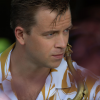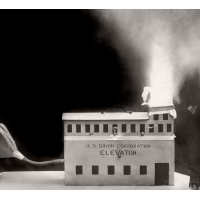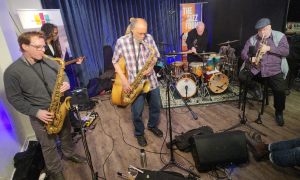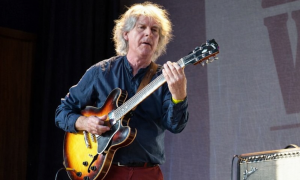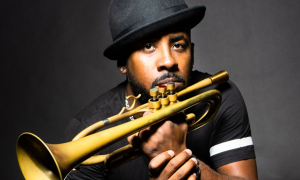Home » Jazz Articles » Live Review » TD Ottawa Jazz Festival 2018
TD Ottawa Jazz Festival 2018
June 26: Alison Krauss, Top Shelf Main Stage
It's almost impossible to believe that singer and fiddler Alison Krauss is now on the south side of her forties. Winning local contests in her hometown of Decatur, IL by age ten and making her first record at fourteen, Krauss is the obvious torch-carrier for two other country/bluegrass singers: Dolly Parton and Emmylou Harris. But with both Parton and Harris still alive and active, she's not so much a torch-carrier as a tradition-bearer, helping to insure that music with deep roots in the American south remains relevant, but in her own inimitable fashion.Indeed, Krauss' longtime band, Union Station, has become one of the true litmus tests for the relevance of traditional bluegrass and country music, in particular since the diminutive singer was invited to join the two year-old group for its 1989 debut, Two Highways (Rounder Records). But with that group now truly a band of individual stars as well as a collective one, most members of the group all have their own projects, allowing Krauss to build a small but significant discography under her own name.
Her appearance at the 2018 TD Ottawa Jazz Festival was in support of her recent solo record, Windy City (Capitol, 2017), though the singer (who almost always had her fiddle in hand, even if she only played it relatively infrequently) not only traversed her long career with and without Union Station, but included a surprising amount of material from external sources. A mid-concert trio of songs came from the soundtrack to the Coen Brothers' 2000 loose, deep south retelling of Homer's The Odyssey, O Brother, Where Art Thou?. Two songs were culled from her Grammy Award-winning collaboration with Robert Plant, Raising Sand (Rounder). Another, Krauss originally sang on the Nitty Gritty Dirt Band's 50th Anniversary celebration album, Circlin' Back—Celebrating 50 Years (NGDB, 2016). An additional couple of songs came from fellow bluegrass stars the Cox Family. And three more were tunes that she's not yet recorded but come from reputable sources that now beg documentation from Krauss.
Perhaps the most significant definer of Krauss' (almost to the second, including three encores) 90-minute performance at Marion Dewar Park was how quiet it was, barring just a couple of brighter tunes where her stellar septet had the chance to kick things up a bit. Even more remarkable was how Krauss, by opening the set with her near-whisper version of Buddy Cannon's soft ballad from Windy City, "River in the Rain," managed to almost completely silence the large crowd and bring them into her world. There are few outdoor concerts where the old saying "you could hear a pin drop" could apply, and if the largely grassy turf of the Plaza would have silenced that pin had it been dropped onto it...well, you get the point.
Krauss put together a band that included two of her Union Station partners. Banjoist Ron Block largely played acoustic guitar here, but delivered some fine solos towards the end of Krauss' main set. Bassist Barry Bales may have received even less solo space, other than a brief spot during the set-closing medley of "Walk Over God's Heaven," which Krauss recorded with the Cox Family for 1994's I Know Who Holds Tomorrow (Rounder), and an as-yet unrecorded "I Want My Crown," which brought the main set to a close nearly as quiet as its beginning. Still, Bales has always been and remains one of the true anchors of contemporary bluegrass music.
With Bales paired with Jay Bellerose, a tremendously versatile drummer/percussionist who's played with everyone from Billy Childs, Jackson Browne and Suzanne Vega to Rhiannon Giddens, Graham Nash and Bettye LaVette, Krauss had an unshakable yet creative rhythm section that could turn up the heat when required (but still in a relatively quiet way), while contributing plenty to even the most tranquil songs.
Two members of the Cox Family, with whom Krauss has now not only guested but produced (2015's Gone Like the Cotton), were important additions to both Krauss' group and performance, with guitarist/singer Sidney Cox especially impressive on dobro. Singer Suzanne Cox (introduced as a "new grandmother," by Krauss) bolstered the upper end of the four-part harmonies delivered throughout the set by Krauss, Block and the two Coxes. She was also featured on a couple of tunes, including the absolutely riveting last of three encores, "It is Well," another positively sublime song crying out for Krauss to record.
Matt Rollings represented a significant instrumental foundation for the group. A pianist who has recorded and toured often (including many Ottawa dates) with Lyle Lovett, Rollings has also amassed an even richer resume that includes, in addition to performing with artists like Mark Knopfler, Mary Chapin Carpenter and Larry Carlton, producing (Willie Nelson's Grammy Award-winning Summertime: Willie Nelson Sings Gershwin (Legacy, 2016)).
The biggest surprise of the group, however, was the lesser-known but on-the-rise James Mitchell. The long-bearded electric guitarist has performed with everyone from Hank Williams III, Colton James and Cole Swindell to Krauss (Windy City) and Willie Nelson (2018's Last Man Standing). Alongside Rollings, he was an essential member of the group, contributing everything from volume pedal chordal swells to some hardcore country picking on "Let Your Loss Be Your Lesson," the set's first up-tempo tune (eight songs in) that Krauss recorded on Raising Sand, from which she also drew the darker, banjo-drive ballad, "Sister Rosetta Goes Before Us."
If the group was terrific and attention-grabbing, the blonde-haired Krauss almost always remained its focal point, dressed in a comfortable-looking green dress. On record, her voice is often so quiet as to be challenged by a whisper. That she managed to deliver the same nuanced and profoundly subtle voice in an outdoor concert was as remarkable as the rest of the set's many achievements. But if she is, perhaps, best-known for soft balladry and even gentler delivery, she also demonstrated greater power and range on songs like the Windy City's country rich "It's Goodbye and So Long to You," which also featured another stellar solo from Mitchell and an equally impressive fiddle feature for Krauss.
Her fiddle was almost always in hand but played far less often than might be expected or hoped for, with Krauss occasionally adding some rhythmic pizzicato chords and the a fill here and there. Actual solos may have been rarer still but only made them more precious. Still, it was impossible to miss her very specific tone, so warm, so rich that it often sounded more like a viola than a violin.
If Krauss began her show in calm quietude and ended the main set in the same fashion, her three-song encore, featured only the four vocalists, with accompaniment from guitarists Block and Cox, concluded the set even more delicately. The original version of "When You Say Nothing at All" became slightly (but only slightly) more animated on the singer's Now That I've Found You, but "Living Prayer" was just as gentle as on Union Station's Lonely Runs Both Ways. And the show-closing "It is Well" was the perfect way to send an audience home, with comforting harmonies and a message all the more relevant for the times in which we live.
Without pushing it on her audience in any way, Krauss' show was deep in its innate spirituality. Krauss may not have spoken to the audience more than a couple of times, but she was precisely what true spirituality engenders (and which is missing, all too often, in these times): clear gratitude for her career, for an audience interested in her, and, on this night as on many others, for a group of players, singers and, just as important, friends with whom she could present such achingly beautiful music. As confident as she is as a performer, there was also a clear humility that rendered the entire show all the more enthralling. It was a perfect way to closing this year's coverage of the 2018 TD Ottawa Jazz Festival.
As always, the TD Ottawa Jazz Festival staff and its literally hundreds of volunteers were not just friendly and accommodating; they ensured that everyone's needs were met, more often than not without being asked. With no small challenges this year in having to relocate or find new venues while Confederation Park and the National Arts Centre are undergoing their renovations, the festival's ability to meet such difficulties head-on and deal with them in ways that made them largely invisible speaks to the core festival team: Executive Producer Catherine O'Grady and Programming Manager Petr Cancura, who also put together another thoroughly memorable lineup with enough music from across the entire jazz spectrum and beyond, to provide more than just some thing for everyone; with Director of Marketing & Partnerships, Suzan Zilahi, making the festival as easy as possible for members of the media, even when some artists presented significant for the increasingly difficult subject of photography, with so many artists now imposing rigid restrictions thanks to the proliferation of cell phones and other recording devices.
It's a festival that has continued to grow and expand its purview as it approaches its 40th anniversary, despite the undeniable challenges that everything from logistics to the fact that most musicians' contracts look for payment in American dollars, as the Canadian dollar holds relatively steady at 75 cents to the American buck, following a few years of near-parity respite. From a one weekend-only series of concerts in 1980 to an eleven-day event with 100 concerts, the TD Ottawa Jazz Festival continues to not only be a major event for the city, but an event that has found a better balance in its program than many, with more than enough jazz, each and every day, to satisfy discerning fans of any age, but also plenty of big ticket oomph to ensure that it remains fiscally fluid, year-after-year.
Here's looking to 2019!
Tags
Live Reviews
marius neset
John Kelman
Canada
Ottawa
Chris Botti
Dee Dee Bridgewater
Alison Krauss
Bela Fleck
Howard Levy
Herbie Hancock
Jim Doxas
Joe Sullivan
Ernesto Cervini
Francois Bourassa
Rotam Sivan
Tim Berne
David Torn
Ches Smith
Peter Van Huffel
Samuel Blaser
Guillaume Peret
Maciej Obara
Dan Weiss
Bria Skonberg
Kellylee Evans
Petr Cancura
Kimmo Pohjonen
Mari Boine
Jerry Douglas
Russell Malone
Don Ross
Django Bates
Bill Bruford
Terence Blanchard
Jerry Granelli
Robben Ford
Gonzalo Rubalcaba
John Geggie
Roddy Ellias
Nick Fraser
Steve Miller
Boz Scaggs
steely dan
Donald Fagen
Chick Corea
yellowjackets
Quincy Jones
Eric Crystal
Allen Toussaint
Paul McCandless
Michael Logan
Ramsey Lewis
Michael Manson
Will Downing
Greg Wieczorek
Teddy Campbell
Norah Jones
Al Jarreau
Willie Weeks
George Harrison
David Bowie
Randy Newman
James Taylor
Rickie Lee Jones
Vince Gill
Phronesis
Ivo Neame
Anton Eger
Petter Eldh
Trondheim Jazz Orchestra
Jim Hart
Neon Quartet
John Warren
Ingrid Neset
Lionel Loueke
Jack DeJohnette
Dave Holland
Sting
Wayne Shorter
Hakon Kornstad
Michael Janisch
Joey Baron
Mark Lockheart
Julian Arguelles
Tim Whitehead
Iain Ballamy
John Parricelli
Ashley Slater
Chris Batchelor
Steve Argüelles
Nic France
King Crimson
Time Berne
Charlie Parker
Peter Bruun
Gard Nilssen
The World
Magnus Hjorth
Stork
Manfred Eicher
Marc Ducret
Dolly Parton
Emmylou Harris
Robert Plant
Jay Bellerose
Billy Childs
Jackson Browne
Suzanne Vega
Rhiannon Giddens
Graham Nash
Bettye Lavette
Sidney Cox
Matt Rollings
Lyle Lovett
Mark Knopfler
Mary Chapin Carpenter
Larry Carlton
Willie Nelson
Hank Williams III
Colton James
Cole Swindell
PREVIOUS / NEXT
Marius Neset Concerts
Support All About Jazz
 All About Jazz has been a pillar of jazz since 1995, championing it as an art form and, more importantly, supporting the musicians who make it. Our enduring commitment has made "AAJ" one of the most culturally important websites of its kind, read by hundreds of thousands of fans, musicians and industry figures every month.
All About Jazz has been a pillar of jazz since 1995, championing it as an art form and, more importantly, supporting the musicians who make it. Our enduring commitment has made "AAJ" one of the most culturally important websites of its kind, read by hundreds of thousands of fans, musicians and industry figures every month.


